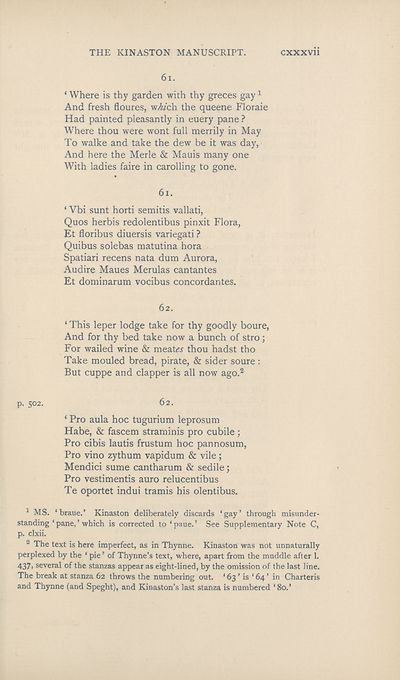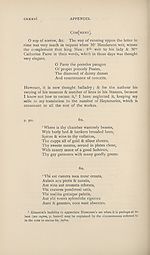Download files
Complete book:
Individual page:
Thumbnail gallery: Grid view | List view

THE KINASTON MANUSCRIPT.
CXXXV11
61.
‘ Where is thy garden with thy greces gay1
And fresh floures, w^/ch the queene Floraie
Had painted pleasantly in euery pane ?
Where thou were wont full merrily in May
To walke and take the dew be it was day,
And here the Merle & Mauis many one
With ladies faire in carolling to gone.
61.
‘ Vbi sunt horti semitis vallati,
Quos herbis redolentibus pinxit Flora,
Et floribus diuersis variegati ?
Quibus solebas matutina hora
Spatiari recens nata dum Aurora,
Audire Maues Merulas cantantes
Et dominarum vocibus concordantes.
62.
‘ This leper lodge take for thy goodly boure,
And for thy bed take now a bunch of stro;
For wailed wine & meater thou hadst tho
Take mouled bread, pirate, & sider soure:
But cuppe and clapper is all now ago.2
p. 502. 62.
‘ Pro aula hoc tugurium leprosum
Habe, & fascem straminis pro cubile;
Pro cibis lautis frustum hoc pannosum,
Pro vino zythum vapidum & vile;
Mendici sume cantharum & sedile;
Pro vestimentis auro relucentibus
Te oportet indui tramis his olentibus.
1 MS. ‘braue.’ Kinaston deliberately discards ‘gay’ through misunder¬
standing ‘ pane, ’ which is corrected to ‘paue.’ See Supplementary Note C,
p. clxii.
2 The text is here imperfect, as in Thynne. Kinaston was not unnaturally
perplexed by the ‘ pie ’ of Thynne’s text, where, apart from the muddle after 1.
437i several of the stanzas appear as eight-lined, by the omission of the last line.
The break at stanza 62 throws the numbering out. ‘ 63 ’ is ‘ 64 ’ in Charteris
and Thynne (and Speght), and Kinaston’s last stanza is numbered ‘80.’
CXXXV11
61.
‘ Where is thy garden with thy greces gay1
And fresh floures, w^/ch the queene Floraie
Had painted pleasantly in euery pane ?
Where thou were wont full merrily in May
To walke and take the dew be it was day,
And here the Merle & Mauis many one
With ladies faire in carolling to gone.
61.
‘ Vbi sunt horti semitis vallati,
Quos herbis redolentibus pinxit Flora,
Et floribus diuersis variegati ?
Quibus solebas matutina hora
Spatiari recens nata dum Aurora,
Audire Maues Merulas cantantes
Et dominarum vocibus concordantes.
62.
‘ This leper lodge take for thy goodly boure,
And for thy bed take now a bunch of stro;
For wailed wine & meater thou hadst tho
Take mouled bread, pirate, & sider soure:
But cuppe and clapper is all now ago.2
p. 502. 62.
‘ Pro aula hoc tugurium leprosum
Habe, & fascem straminis pro cubile;
Pro cibis lautis frustum hoc pannosum,
Pro vino zythum vapidum & vile;
Mendici sume cantharum & sedile;
Pro vestimentis auro relucentibus
Te oportet indui tramis his olentibus.
1 MS. ‘braue.’ Kinaston deliberately discards ‘gay’ through misunder¬
standing ‘ pane, ’ which is corrected to ‘paue.’ See Supplementary Note C,
p. clxii.
2 The text is here imperfect, as in Thynne. Kinaston was not unnaturally
perplexed by the ‘ pie ’ of Thynne’s text, where, apart from the muddle after 1.
437i several of the stanzas appear as eight-lined, by the omission of the last line.
The break at stanza 62 throws the numbering out. ‘ 63 ’ is ‘ 64 ’ in Charteris
and Thynne (and Speght), and Kinaston’s last stanza is numbered ‘80.’
Set display mode to: Large image | Zoom image | Transcription
Images and transcriptions on this page, including medium image downloads, may be used under the Creative Commons Attribution 4.0 International Licence unless otherwise stated. ![]()
| Publications by Scottish clubs > Scottish Text Society publications > Old series > Poems of Robert Henryson > Volume 1, 1914 > (147) |
|---|
| Permanent URL | https://digital.nls.uk/107411939 |
|---|
| Shelfmark | SCS.STES1.64 |
|---|---|
| Attribution and copyright: |
|
| Description | Edited by G. Gregory Smith. |
|---|---|
| Shelfmark | SCS.STES1.64 and SCS.STES1.55 |
| Additional NLS resources: | |
| Description | A collection of over 100 Scottish texts dating from around 1400 to 1700. Most titles are in Scots, and include editions of poetry, drama, and prose by major Scottish writers such as John Barbour, William Dunbar, Gavin Douglas, and George Buchanan. Edited by a key scholarly publisher of Scotland's literary history, and published from the late 19th century onwards by the Scottish Text Society. Available here are STS series 1-3. |
|---|

